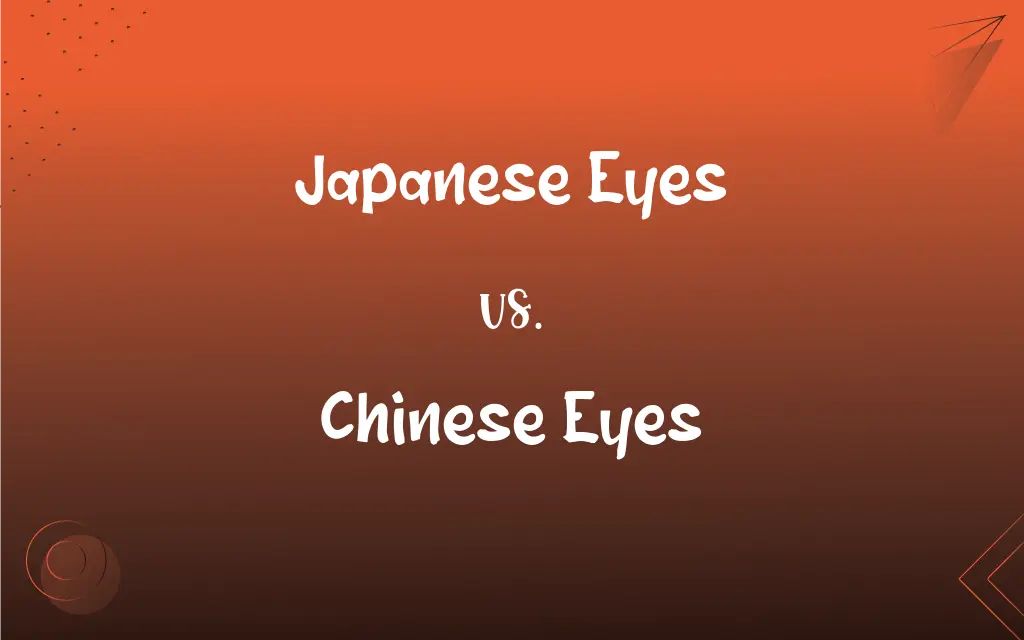Japanese Eyes vs. Chinese Eyes: What's the Difference?
Edited by Aimie Carlson || By Harlon Moss || Updated on October 31, 2023
Both "japanese eyes" and "chinese eyes" refer to perceived common eye features of their respective populations, but individual variation makes generalizations inaccurate and potentially stereotypical.

Key Differences
The terms "japanese eyes" and "chinese eyes" often carry cultural and physical stereotypes, yet there's no definitive characteristic that can accurately distinguish between the two. Both Japan and China have diverse populations with a wide range of eye shapes, sizes, and other facial features. Just as with any ethnic group, individual variations within the populations mean that categorizing "japanese eyes" or "chinese eyes" based on specific physical features can be misleading.
When some people refer to "japanese eyes," they might be thinking of specific representations in art or media. The same goes for "chinese eyes." However, it's essential to remember that these representations might not accurately reflect the diverse range of appearances in these populations.
It's also crucial to understand that using "japanese eyes" or "chinese eyes" to describe someone's appearance might be seen as reductive or stereotypical. Each individual's features are unique, and it's oversimplistic to attribute a specific eye shape or size to an entire ethnicity.
Both "japanese eyes" and "chinese eyes" as descriptors can perpetuate stereotypes and misconceptions. It's essential to approach these terms with sensitivity, understanding, and respect.
Comparison Chart
Historical Representation
Often depicted in traditional Japanese art
Frequently portrayed in classical Chinese art
ADVERTISEMENT
Media Stereotypes
Sometimes seen as larger in anime
Often associated with almond-shaped in movies
Variability
Wide range of shapes and sizes within population
Extensive range of shapes and sizes within population
Misconceptions
Not all have "double eyelids"
Not all have "monolids"
Sensitivity
Use can be seen as reductive or stereotypical
Use can be viewed as reductive or stereotypical
Japanese Eyes and Chinese Eyes Definitions
Japanese Eyes
Japanese eyes may describe cultural expressions seen in Japanese art or media.
Anime characters often have exaggerated Japanese eyes.
ADVERTISEMENT
Chinese Eyes
Chinese eyes refer to the physical eye characteristics commonly associated with the Chinese population.
People often said he had his mother's Chinese eyes.
Japanese Eyes
Japanese eyes refer to the physical eye characteristics commonly associated with the Japanese population.
She believed her Japanese eyes resembled her grandmother's.
Chinese Eyes
Chinese eyes might indicate a broader understanding of Chinese perspectives or viewpoints.
Through Chinese eyes, the dragon symbolizes power and strength.
Japanese Eyes
Japanese eyes might be used poetically to describe elements of Japanese nature or aesthetics.
The sunset was as mesmerizing as Japanese eyes.
Chinese Eyes
Chinese eyes may be used poetically to describe elements of Chinese culture or aesthetics.
The landscape was as captivating as Chinese eyes.
Japanese Eyes
Japanese eyes can sometimes indicate a broader understanding of Japanese perspectives or viewpoints.
Through Japanese eyes, the ceremony had a deeper meaning.
Chinese Eyes
Chinese eyes can describe cultural expressions observed in Chinese art or media.
Traditional paintings often capture the essence of Chinese eyes.
Japanese Eyes
Japanese eyes, when used carelessly, can stereotype or oversimplify diverse appearances.
It's not accurate to assume all Japanese eyes look the same.
Chinese Eyes
Chinese eyes, when used carelessly, can stereotype or oversimplify diverse appearances.
You can't group all Chinese eyes into one category.
FAQs
How do "japanese eyes" differ in media representations like anime?
Anime often exaggerates eye size, which might not reflect actual characteristics.
Can you distinguish someone's nationality based on "japanese eyes" or "chinese eyes"?
No, there's wide variability within each ethnicity; such descriptions are not definitive.
Are there stereotypes associated with "japanese eyes" and "chinese eyes"?
Yes, media and historical representations have created certain stereotypes, but these are often oversimplified.
Is it accurate to say all Japanese or Chinese people have specific eye shapes?
No, there's a wide range of shapes and sizes within each population.
Is it appropriate to use "japanese eyes" or "chinese eyes" to describe someone?
Using these terms can be seen as reductive or stereotypical; it's better to avoid generalizing.
How do "chinese eyes" get portrayed in movies?
Movie portrayals often lean into stereotypes, like almond-shaped eyes, but these don't represent the entire population.
Can "japanese eyes" or "chinese eyes" refer to perspectives or viewpoints?
Yes, they can sometimes indicate a broader understanding of respective cultural perspectives.
How should one approach the use of these terms?
With sensitivity, understanding, and respect.
Do all Chinese people have "monolids"?
No, there's significant variability in eye shape among the Chinese population.
How do contemporary artists from Japan or China view these terms?
Views vary, but many artists challenge or critique stereotypes associated with these terms.
What do "japanese eyes" and "chinese eyes" mean?
Both terms refer to eye characteristics associated with Japanese and Chinese populations, respectively, but both can vary widely.
Why are there misconceptions about "japanese eyes" and "chinese eyes"?
Media portrayals, historical art, and lack of exposure contribute to generalized views.
Are there other terms that can be used to describe eyes without resorting to ethnicity?
Yes, terms like almond-shaped, hooded, or monolid can describe eye shapes without referencing ethnicity.
Do all Japanese people have "double eyelids"?
No, there's a wide range in eyelid shapes among the Japanese population.
Are "japanese eyes" and "chinese eyes" terms used globally?
They might be recognized globally, but their use and sensitivity can vary by region.
Should one avoid using "japanese eyes" and "chinese eyes" in casual conversations?
It's wise to be cautious and avoid potential stereotyping or reductionism.
What's the key takeaway about these terms?
Recognize the diversity within each ethnicity and approach the terms with sensitivity and respect.
Are "japanese eyes" and "chinese eyes" sensitive terms?
Yes, they can perpetuate stereotypes and misconceptions.
How are these terms perceived in academic or scientific contexts?
They're often seen as oversimplified and not suitable for precise or scientific discussions.
Do the terms have any poetic or metaphorical meanings?
They can be used poetically to describe elements of respective cultures or aesthetics.
About Author
Written by
Harlon MossHarlon is a seasoned quality moderator and accomplished content writer for Difference Wiki. An alumnus of the prestigious University of California, he earned his degree in Computer Science. Leveraging his academic background, Harlon brings a meticulous and informed perspective to his work, ensuring content accuracy and excellence.
Edited by
Aimie CarlsonAimie Carlson, holding a master's degree in English literature, is a fervent English language enthusiast. She lends her writing talents to Difference Wiki, a prominent website that specializes in comparisons, offering readers insightful analyses that both captivate and inform.































































